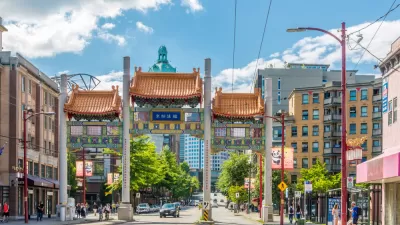Vancouver has the most farmland and farmers in North America. However, as Vancouver booms, the thriving agricultural belt that surrounds Greater Vancouver is at risk from an expanding city.
Vancouver's farmland is passing into a new generation. Many of the region's farms, many at only a few acres in size, are thriving. Crops are selling for a tremendous premium, compared to the cheap imports from international markets that sail in through the city's port. Still, Vancouver's farms are facing increased pressure from the expanding city.
"As distinctive and productive as Vancouver's farms are, they're also under greater threat than any others in the country, because of the fierce competition for land in this region. The competition comes, for starters, from housing subdivisions, with speculation on farmland driving prices as high as $100,000 an acre in some places. This leads to constant friction between farmers and new homeowners unimpressed by the smell of pigs and mushrooms. " writes Vancouver Magazine's Frances Bula. "Equally threatening is the demand to convert agricultural land to industrial use."
Additionally, some worry about the greater picture; British Columbia's over-reliance on cheap, imported food, challenging efforts to give incentives to locally-produced food. Despite the province's ability to grow tremendous amounts of food, much of that crop is exported at a Canadian premium in exchange for cheap, imported food. And, if the port, housing subdivisions, industry, and infrastructure continue to edge their way into previously agricultural lands, the province may find itself less able to produce its own food.
FULL STORY: The Future of Vancouver's Farmland

Alabama: Trump Terminates Settlements for Black Communities Harmed By Raw Sewage
Trump deemed the landmark civil rights agreement “illegal DEI and environmental justice policy.”

Study: Maui’s Plan to Convert Vacation Rentals to Long-Term Housing Could Cause Nearly $1 Billion Economic Loss
The plan would reduce visitor accommodation by 25% resulting in 1,900 jobs lost.

Planetizen Federal Action Tracker
A weekly monitor of how Trump’s orders and actions are impacting planners and planning in America.

Wind Energy on the Rise Despite Federal Policy Reversal
The Trump administration is revoking federal support for renewable energy, but demand for new projects continues unabated.

Passengers Flock to Caltrain After Electrification
The new electric trains are running faster and more reliably, leading to strong ridership growth on the Bay Area rail system.

Texas Churches Rally Behind ‘Yes in God’s Back Yard’ Legislation
Religious leaders want the state to reduce zoning regulations to streamline leasing church-owned land to housing developers.
Urban Design for Planners 1: Software Tools
This six-course series explores essential urban design concepts using open source software and equips planners with the tools they need to participate fully in the urban design process.
Planning for Universal Design
Learn the tools for implementing Universal Design in planning regulations.
Caltrans
Smith Gee Studio
Institute for Housing and Urban Development Studies (IHS)
City of Grandview
Harvard GSD Executive Education
Toledo-Lucas County Plan Commissions
Salt Lake City
NYU Wagner Graduate School of Public Service




























